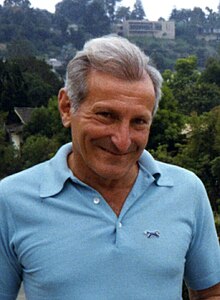Harold Lewis
Harold "Hal" Warren Lewis (born October 1, 1923 in New York City - † May 26, 2011 ) was an American physicist .
Life
Lewis studied from 1940 at New York University and at the University of California, Berkeley , physics (master's degree in 1944). Then he was in the US Navy. Lewis worked at the Institute for Advanced Study from 1947 to 1948 (and also in 1950/51) before receiving his doctorate in Berkeley in 1948. From 1948 to 1953 he was an assistant professor at the University of California and from 1951 to 1956 a member of Bell Laboratories . In 1953 he became a Fellow of the American Physical Society . From 1956 he was an associate professor and then a professor at the University of Wisconsin . From 1964 he was a professor at the University of California, Santa Barbara . From 1969 to 1973 he was director of the Quantum Institute there . From 1991 he was Professor Emeritus .
Lewis was a member of the JASON Defense Advisory Group , which he chaired from 1966 to 1973 and where he dealt with missile defense. He also spent a long time on the Defense Science Board, where he dealt with the consequences of a nuclear war in the 1980s ( nuclear winter ). In the 1970s he dealt with safety issues in civil nuclear energy, was head of a corresponding commission of the American Physical Society on light water reactors and reviewed the Rasmussen Report (in the so-called Lewis Report ) published by the Nuclear Regulatory Commission in 1978 , Although he came to critical assessments of their main conclusions, overall he considered the safety of civilian nuclear power to be given.
Lewis also wrote popular science books and received a 1991 Science Writing Award for his book Technological Risk .
In 2010 he attracted attention when he resigned from the American Physical Society after 67 years of membership , which he believed was corrupted by government research funding on the problem of global warming , which he said did not exist at all .
Lewis died on May 26, 2011, leaving behind his wife Mary Lewis.
Fonts
- The foundations of fuzzy control , Plenum Press 1997
- Technological Risk , Norton 1990
- Why flip a coin. The art and science of good decisions , Wiley 1997
Quotes
"[...] the global warming scam, with the (literally) trillions of dollars driving it, that has corrupted so many scientists, and has carried APS before it like a rogue wave. It is the greatest and most successful pseudoscientific fraud I have seen in my long life as a physicist. "
“[...] the global warming fraud, fueled by (literally) trillions of dollars, has corrupted so many scientists and carried the APS along like a monster wave. Global warming is the biggest and most successful pseudoscientific scam I have seen in my long life as a physicist. "
Web links
- Oral History Interview
- Literature by and about Harold Lewis in the WorldCat bibliographic database
Individual evidence
- ↑ a b University of California, Santa Barbara Campus Notes 93106 ( Memento of the original from July 24, 2011 in the Internet Archive ) Info: The archive link was inserted automatically and has not yet been checked. Please check the original and archive link according to the instructions and then remove this notice. at ucsb.edu, accessed June 11, 2011
- ↑ Lewis et al. a. Report to the APS by the Study Group on Light Water Reactor Safety , Reviews of Modern Physics, Volume 47, 1975, Suppl. 1. Physics Today, July 1975.
- ↑ Lewis et al. a. Risk Assessment Review Group Report to the US Nuclear Regulatory Commission , NUREG-CR / 0400, Washington DC, NRC, 1978. Lewis et al. a. IEEE Transactions Nuclear Science, Volume 26, 1979, p. 4686. The group also included Frank von Hippel and Frederick Zachariasen
- ↑ Andrew Revkin, New York Times Blog, October 2010
- ↑ Harold Lewis: "The largest and most successful pseudo-scientific fraud" , Fusion 32, 2011, No. 1, pp. 41-42 (German translation of the withdrawal declaration) (PDF; 386 kB)
- ↑ Hal Lewis: My Resignation From The American Physical Society (October 6, 2010) ( Memento April 26, 2013 in the Internet Archive )
| personal data | |
|---|---|
| SURNAME | Lewis, Harold |
| ALTERNATIVE NAMES | Lewis, Harold Warren (full name); Lewis, Hal Warren (nickname) |
| BRIEF DESCRIPTION | American physicist |
| DATE OF BIRTH | October 1, 1923 |
| PLACE OF BIRTH | New York City |
| DATE OF DEATH | May 26, 2011 |
